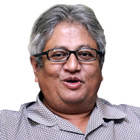What it means to be liberal

Any group of volunteers doing such good work should be supported, especially when others who are critical of SIS do very little (if anything at all) for women’s rights and welfare.
Zaid Ibrahim, The Star
Living in peaceful co-existence, respecting diversity of ethnicity and religion, and respecting individual rights are principles we uphold as members of the United Nations.
MALAYSIA was recently made a non-permanent member of the United Nations (UN) Security Council. Congratulations are in order to those who laboured for this achievement, including our hard-working Foreign Minister, who has travelled the world canvassing support, and our Prime Minister, who has always made his presence felt at the UN General Assembly.
They are continuing the good work begun by previous Malaysian leaders who, very early in the life of our nation, were already committed to the principles of the UN.
What are those principles? For a start, the UN promotes universal values amongst its members that include living in peaceful coexistence, recognising and respecting diversity of ethnicity and religion, and respecting individual rights.
Among other things, the UN works with member countries to promote justice and the rule of law, grant equal rights to all regardless of race or gender and put in place non-discriminatory laws in the workplace and in society.
In accepting its covenants and principles, some countries embrace these universal values wholeheartedly while others have reservations, particularly with regard to local religious and cultural traditions.
All, however, work towards a common goal for all humanity. That’s what membership in the UN entails.
When I was in Kota Baru last weekend, some Malay youths asked why I supported Sisters in Islam (SIS). I told them that as a country, we must embrace the values and principles of the UN.
SIS is a lawfully registered organisation that has worked hard over the past 15 years to help women in distress. Some of the people they aid are in financial difficulty because their husbands have left them high and dry and uncertain about their marital status. Some are denied their rights to property, proper maintenance or access to their children. Some do not know what their rights are at all.
Any group of volunteers doing such good work should be supported, especially when others who are critical of SIS do very little (if anything at all) for women’s rights and welfare.
Then the youths asked me if SIS was a “liberal” organisation. I do not appreciate that amongst Malaysian Muslim youths today, the word “liberal” has become dirty and sinful.
During my schooldays, a person of “liberal disposition” was to be welcomed. Our teachers expected us to have open minds and to read books, including English literature (which seems to be an alien thing today).
We were encouraged to speak freely and be unafraid about having diverse ideas. We were encouraged to discuss issues in class, and school debates were regular affairs.
In Kota Baru, I asked one of my young interlocutors why he did not like liberals and liberalism. He seemed to think being liberal meant not believing in God, having “free sex” and doing whatever one liked.
In other words, being “liberal” to him meant engaging in sin and doing things that were un-Islamic, which is certainly tragic because he is a university student and should know that this is a perversion of the terms “liberal” and “progressive”.
“Liberalism” is not a religion in and of itself. It’s just a word that describes an attitude and a way of looking at things. For example, Islam is a liberal and progressive religion because it recognised women’s rights, even rights to matrimonial property, long before European society did.
Being at the forefront of a social reform agenda that (for example) promotes the core universal values of the UN is a sign of being liberal and progressive.
Being open to new ideas to serve the public without fear or favour is also a liberal and progressive attitude. When our Prime Minister asked Selangor Umno to look at doing things differently and think out of the box to regain people’s trust, he was engaging in promoting progressive and liberal ideas.
Then this Malay youth asked me about pluralism and why, as a Muslim, I would support pluralism as well – so I asked him what he understood the term to mean.
He said that as Muslims, we must believe our religion to be superior to all others and the sole bearer of truth – other religions are false and therefore, he argued, if we supported pluralism we would put Islam at par with other religions. This, he said, was a sin that Muslims must resist.
I explained to him that pluralism was not a religious doctrine or a belief system. It’s not even a method of determining which religion is “true” or “false”. It’s simply a principle of peaceful coexistence. Every believer believes his or her God is the only true God, and his or her religion the only one that brings true salvation and redemption.
That’s fine, but because we live in a multi-religious country like Malaysia, there must be a formula for peaceful co-existence or else religious conflict will be inevitable.
Pluralism entails an acceptance that others have the right to practise their faiths and beliefs freely and Article 11 of the Federal Constitution captures that spirit and meaning in the fundamental law of our country.
As such, all people of faith in Malaysia have a constitutional duty to work together and engage one another if there are problems. We have an obligation to our nation and to ourselves to seek solutions to our problems peacefully.
I told the young man that this was all that pluralism meant and that he should not be afraid. It’s the living formula of the UN and, as our country is an active member of it (and now also a member of the Security Council), we should not be either.

